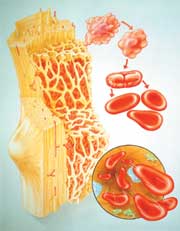Russia builds data bank of bone marrow donors
From 1,200 to 1,500 children in Russia need transplantation of the bone marrow each year

About 700 people had their blood tests taken at the Russian Children's Clinical Hospital in Moscow last Saturday. The same day their blood samples were sent to Berlin for study. Those people are the potential donors of bone marrow. Information about donors will be available to Russian patients at the Karelian foundation of donors of hemopoietic stem cells. 
The event was the first one of the kind ever held in Moscow. It turned out to be the largest charity action in Russia. The action was organized by Donors to Children; the Karelian Register of Non-relative Donors of Hemopoietic Stem Cells, a charitable fund; the Stephen Morsch Foundation, a German charity; and hematology department of the Russian Children's Clinical Hospital. The organizers did not expect such a huge turnout. There was a steady flow of people heading for the fourth floor of the hospital where 16 hematologists were in charge of blood tests. The people were smiling, and the doctors were smiling back.
Bater Dzhumbayev, 20, is a construction worker in the Moscow region. “It took me four hours to get here from Kolomna. I want to give my blood for the benefit of children. I made up my mind right after watching the story on TV,” said Bater. Peter and Ksenia heard the call for help on the radio. Parents of the children who were treated at the hematology department of the hospital also gave their blood samples for study.
From 1,200 to 1,500 children in Russia need transplantation of the bone marrow each year. Hospitals are capable of conducting only 60-80 bone marrow transplants a year. In other words, only 5 percent of the above number of children can be treated successfully. There are 5 million people at the U.S. register of bone marrow donors. About 3 million donors are registered in Germany. There is no national register of donors in Russia. There are two foundations and several thousand donors. It is the Karelian foundation that provided compatible donors for two Russian patients last year. It is quite surprising since only one donor out of ten thousand is compatible, according to statistics.
“It is difficult to find the right donor at the international register,” said Galina Novichkova, deputy director of the Russian Scientific Center of Children's Hematology, Oncology and Immunopathology. “We need our own genetic material because we are dealing with a cocktail of different varieties of blood (patients from Central Asia and Caucasus) which does not occur anywhere else,” added she.
Besides, one must pay around 15 thousand euros for the search of a donor through the international register. The Russian government promised to build a hematology center in two years. The facility will have a laboratory to conduct typing tests (tissue compatibility tests). Meanwhile, the hospital has blood samples tested at the expense of the Stephen Morsch Foundation. Each test costs the charity 40 euros.
Twenty-nine actors of the Moscow theater company Sovremennik donated their blood two days prior to the charity at the Central Children's Clinical Hospital. “We would not have had any help if the popular actors had not drawn attention to the problems,” said Katya Chistyakova, a coordinator of Donors to Children. “The sponsors and the media would have paid attention to us had if not for that charity show in the Sovremennik featuring Chulpan Khamatova, Dina Korzun and other well-known people. A year ago nobody showed any interest in our problems at to the lack of blood, we could not raise the alarm via the NTV story back then. Nobody cared for us until these people shared some of their popularity with children,” said Katya Chistyakova.
Discuss this article on Pravda.Ru English Forum
Subscribe to Pravda.Ru Telegram channel, Facebook, RSS!


